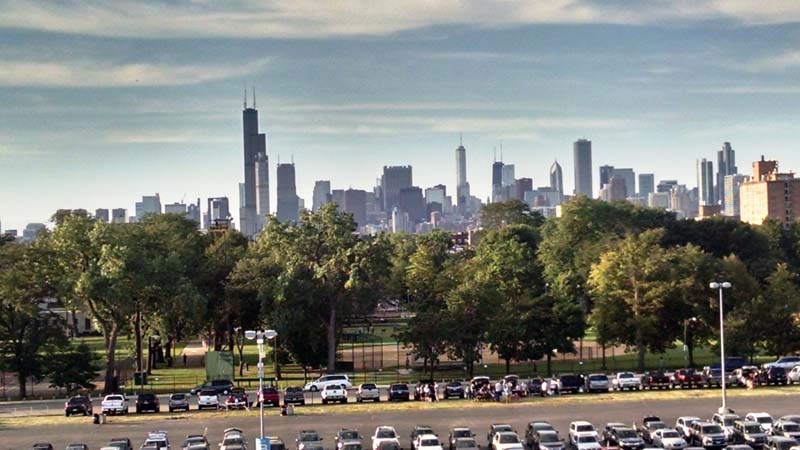The Morton Arboretum, its key collaborator Openlands, and other leading organizations from across the Chicago Region have formed a partnership to build a healthier and more diverse urban forest by 2050 and to leverage resources - financial, knowledge, skill, and expertise.
The issues identified by CRTI require considerable information gathering, analysis, and consensus to develop a strategy that is pragmatic, actionable, measurable, and supported by a broad range of forest managers. Partners across the region, both in the public and private sectors, including landowners and managers, must engage and take ownership in the steps necessary to ensure a healthy forest for the region.
Thirteen key organizations form the leadership of CRTI. These organizations were chosen to lead CRTI due to their exemplary track records and existing programs supporting the regional forest and their shared missions advocating for trees. This partnership will enable all thirteen organizations to amplify their effects on the region by sharing resources and expertise. Representatives from the lead organizations form the Executive Advisory Council charged with steering the critical efforts of CRTI through topic-driven work groups which have representation from many regional agencies.
The Morton Arboretum
mortonarb.org
The Morton Arboretum is an internationally recognized nonprofit outdoor museum that conserves, collects and studies trees from around the world. The Arboretum is working toward a greener, healthier, more beautiful world by educating people to plant, protect and preserve trees.
Executive Advisory Council representative: Gerard Donnelly, Ph.D., President and CEO
Openlands
openlands.org
Openlands unites the people and resources of the diverse Chicago metropolitan region around the goal of land and water protection, providing a healthy vibrant space to live and work.
Executive Advisory Council representative: Gerald W. Adelmann, President and CEO
Chicago Department of Public Health
chicago.gov/city/en/depts/cdph.html
The Chicago Department of Public Health provides guidance, services, and strategies that make Chicago a healthier and safer city.
Executive Advisory Council representative: Raed Mansour, Director
Chicago Metropolitan Agency for Planning
cmap.illinois.gov
The Chicago Metropolitan Agency for Planning (CMAP) is the region’s official comprehensive planning organization. Its ON TO 2050 plan will help the seven counties and 284 communities of northeastern Illinois to implement strategies that address transportation, housing, economic development, open space, the environment, and other quality-of-life issues.
Executive Advisory Council representative: Erin Aleman, Executive Director
Chicago Park District
chicagoparkdistrict.com
The mission of the Chicago Park District is to enhance the quality of life in Chicago by becoming the leading provider of recreation and leisure opportunities, provide safe, inviting and beautifully maintained parks and facilities, and create a customer-focused and responsive park system that prioritizes the needs of children and families.
Executive Advisory Council representative: Michael Kelly
Forest Preserves of Cook County
fpdcc.com
The Forest Preserve of Cook County, with more than 69,000-acres, is the largest forest preserve district in the United States. It receives an estimated 40 million visits each year, providing an escape into a world teeming with wildlife and rich with outdoor recreation and environmental education opportunities.
Executive Advisory Council representative: Arnold Randall, General Superintendent
Illinois Landscape Contractors Association
ilca.net
The nonprofit trade association's mission is to enhance the professionalism and capabilities of members by providing leadership, education, and valued services while promoting environmental awareness within the landscape industry.
Executive Advisory Council representative: Scott Grams, Executive Director
Metropolitan Mayors Caucus
mayorscaucus.org
Founded in 1997, the Metropolitan Mayors Caucus provides a forum for metropolitan Chicago’s chief elected officials to collaborate on common problems and work toward a common goal of improving the quality of life for the millions of people who call the region home.
Executive Advisory Council representative: Dave Bennett, Executive Director
Metropolitan Water Reclamation District
mwrd.org
The District protects the health and safety of the public in its service area, protects the quality of the water supply source (Lake Michigan), improves the quality of water in watercourses in its service area, protects businesses and homes from flood damages, and manages water as a vital resource for its service area. The District serves an area of 883 square miles which includes the City of Chicago and 125 suburban communities.
Executive Advisory Council representative: Allison Fore, Public and Intergovernmental Affairs Officer
The Nature Conservancy
nature.org
Founded in 1951, the Nature Conservancy is a global organization that works in all 50 U.S. states and more than 35 countries to protect ecologically important lands and waters for nature and people and advance conservation around the world.
Executive Advisory Council representative: Jeff Walk, Director of Conservation
Executive Advisory Council representative: J. Eric Smith, President and CEO
U.S. Forest Service
fs.fed.us
The Forest Service, part of the U.S. Department of Agriculture, is a multi-faceted federal agency that protects and manages 154 national forests and provides technical and financial help to state and local government agencies, businesses, private landowners to help protect and manage non-federal forest and associated range and watershed lands.
Executive Advisory Council representative: Lynne Westphal, Project Leader / Research Social Scientist

